|
|
|
Sort Order |
|
|
|
Items / Page
|
|
|
|
|
|
|
| Srl | Item |
| 1 |
ID:
110828
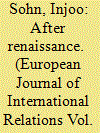

|
|
|
|
|
| Publication |
2012.
|
| Summary/Abstract |
Why does a re-emerging China pursue institutional strategies to expand its multilateral ties all over the world? This study explains the genesis of China's new multilateral diplomacy toward Africa, Latin America, and the Middle East. The central argument of the study is that many strands of structural arguments drawn from realist, liberal, and constructivist insights cannot provide complete explanations about China's multilateral activism without recourse to cognitive feedback dynamics. China fed its regional experiences of multilateralism back into its global policy formation. This experiment-based approach has been a pervasive feature in Chinese multilateral diplomacy as well as Chinese domestic reforms during the post-Mao period. The cognitive feedback model developed in this study intends to complement the prominent structural explanations by identifying micro-level dynamics and seeks to contribute to today's debate over power transition and international order.
|
|
|
|
|
|
|
|
|
|
|
|
|
|
|
|
| 2 |
ID:
167607
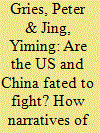

|
|
|
|
|
| Summary/Abstract |
Are the United States (US) and China destined to fall into a ‘Thucydides trap’ of power transitions leading to great power conflict? This study explores how the intersubjective perception of media-disseminated narratives of US–China interdependence may shape the likelihood of war. In two randomized online experiments, we manipulated ordinary Americans’ perceptions of US–China relations with real CNN video clips that narrated a US–China power transition as either positive or zero sum. Across both experiments, more zero-sum narratives boosted perceived US–China competition, increasing intergroup mistrust, anger and subsequent desires for a tougher China policy. The second study also revealed that individual differences in nationalism and uncertainty avoidance moderated the effects of the perception of media narratives on mistrust and anger. Viewers actively interpret media they are exposed to. These findings empirically demonstrate the power of narratives: specifically, they reveal the psychological mechanisms linking structural changes in the balance of power to the individual-level processes that may determine great power war and peace.
|
|
|
|
|
|
|
|
|
|
|
|
|
|
|
|
| 3 |
ID:
162769
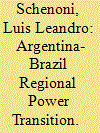

|
|
|
|
|
| Summary/Abstract |
Almost four decades have passed since the Argentina-Brazil balance of power gave way to a Brazilian uncontested primacy in the Southern Cone. The peaceful and cooperative nature of this regional power transition poses an interesting puzzle for structural theories and those concerned with the US-China transition. Why do certain countries accept accommodation more leniently, like Argentina did? I offer an explanatory model and use process tracing to show that key cooperative turns in this bilateral relationship—during the late 1970s and early 1990s—required concurrent structural changes, both at the international and domestic levels. My conclusions suggest, against the prevalent narrative, that cooperation between Argentina and Brazil was not a product of democracy. Instead, peaceful power transitions take place when the costs of confrontation are high and social coalitions are largely redefined in the declining state.
|
|
|
|
|
|
|
|
|
|
|
|
|
|
|
|
| 4 |
ID:
131995


|
|
|
|
|
| Publication |
2014.
|
| Summary/Abstract |
Within the scholarly debate on the current power transition in the international system, particular importance is attached to China's economic rise and the global shifts it is bringing forth in material primacy. A thorough understanding of these shifts in the relative distribution of power, however, requires leaving the narrow path of material capabilities and looking at normative accounts as well. Taking up this challenge, the article focuses on the political dimension of China's rise by exploring the country's alignment with South American governments along two dimensions: the convergence of their foreign policy ideas and the provision of diplomatic links facilitating their cooperation and coordination in global politics. The empirical analysis depicts a nascent global agenda forming between China and certain South American countries and shows that, along with growing levels of foreign policy compatibility, China has also advanced its diplomatic inroads into the region, particularly at the level of bilateral relations. Taking these developments as a whole, it is suggested that China has gained international attraction in terms of its visions of global order and as a potential political partner throughout the region. The article concludes with a discussion of the findings in light of the ongoing relative shifts in the distribution of global power beyond material primacy, and the prospects for China's further political rise.
|
|
|
|
|
|
|
|
|
|
|
|
|
|
|
|
| 5 |
ID:
179321
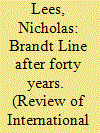

|
|
|
|
|
| Summary/Abstract |
The Brandt Line is a way of visualising the world that highlights the disparities and inequalities between the wealthy North and the poorer Global South. Forty years after its popularisation as part of a call for global reform, is the Brandt Line now a misleading way of representing world politics? This article assesses whether the Global South has lost its distinctiveness and coherence relative to the North since 1980. Existing assessments of global inequality do not settle the question of whether the North–South divide remains relevant for international relations because they overlook the most politically significant measures of inequality. Drawing on power transition theory, this article provides a systematic assessment of the North–South divide in terms of levels of economic development, relative inequality, economic power, and political satisfaction. The evidence suggests that the Brandt Line is largely intact. Although the economic diversity of the South has increased and its collective economic power has risen, relative income rankings remain unaltered and the states of the Global South are as dissatisfied as they were four decades ago. Differential growth rates are reshaping world politics without eroding the North–South divide traced by the Brandt Line.
|
|
|
|
|
|
|
|
|
|
|
|
|
|
|
|
| 6 |
ID:
108377
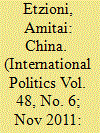

|
|
|
|
|
| Publication |
2011.
|
| Summary/Abstract |
Commentators in the Western media, the United States Congress and academia are increasingly contending that China is on its way to becoming a threatening global force, an adversary, if not an enemy. This article examines whether those views are justified, after first establishing the importance of critically assessing all claims that a nation is turning into an adversary. The examination proceeds by summarizing the arguments of those who consider China an adversary in the making - the 'adversarians' - and the responses of those who hold China is leaning toward a peaceful development and should be engaged - the 'engagers'. The discussion is organized into three segments, each analyzing the debate with regard to the different sectors of power: military/geopolitical, economic and ideational. The concluding sections explore alternative American responses to China's rising power in each of the three sectors.
|
|
|
|
|
|
|
|
|
|
|
|
|
|
|
|
| 7 |
ID:
102653
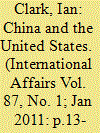

|
|
|
|
|
| Publication |
2011.
|
| Summary/Abstract |
This article critically reviews the suggestion that we are experiencing a 'succession of hegemonies' from the United States to China. It develops Martin Wight's writings on hegemony, and introduces a fundamental distinction (not made by Wight) between a power transition and a hegemonic succession. Wight held complex views about the nature of power and at times seemed to subscribe to a purely materialist account. Elsewhere he was more nuanced and appealed to the purpose of dominant states as part of his argument that influence does not correlate exactly with mass and weight. This suggestion is developed in the author's view of hegemony-as distinct from primacy-as denoting a legitimate practice within international society. These ideas are then superimposed upon current debates about a power transition, or a succession of hegemonies, as between the United States and China. The existing debate conflates those two issues. Accordingly, while it can readily be acknowledged that there are important indicators of a shift in the material distribution of power, this in no way amounts, as yet, to any kind of hegemonic succession. For the latter to occur, there would need to be clear evidence of an effective socialization of the aspirant hegemon's purpose and support for its preferred order. On the contrary, to date China has been largely content to operate within existing frameworks, rather than instigate a revision of them, and does not yet present a model for emulation elsewhere. It is possible that a power transition, without any hegemonic succession, could be corrosive of global governance.
|
|
|
|
|
|
|
|
|
|
|
|
|
|
|
|
| 8 |
ID:
148941
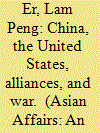

|
|
|
|
|
| Summary/Abstract |
Chinese President Xi Jinping emphatically rejects the so-called Thucydides Trap and its analogy that a rising China is destined for war with the United States, the status quo great power. But there is a contradiction between Beijing's peaceable rhetoric about a “New Type of Major Power Relations” with the US, and Beijing's disregard for the US and its allies. concerns about rising Chinese assertiveness in the East and South China Seas. It is not inconceivable that smaller Chinese and American allies in East Asia might well drag the US and China into a conflict rather than a conflict directly caused by the “power transition” between the two great powers per se.
|
|
|
|
|
|
|
|
|
|
|
|
|
|
|
|
| 9 |
ID:
192039


|
|
|
|
|
| Summary/Abstract |
We explore the possibilities and limitations of models of the demand for military expenditures, as against additional kinds of cross-country analyses, with an empirical focus on the Indo-Pacific region. Our research bridges a gap between the Defence Economics and International Relations literatures by developing testable security alignment hypotheses and by testing these hypotheses in three ways: with demand modelling on total expenditures, with analyses on estimated stocks of imported armaments, and with qualitative analyses of trends in defence cooperation between states. We find consistent evidence across research methods of an increase in threat perceptions towards China since around 2012 and of balancing behaviour by US allies and by two non-allies. As compared to standard demand modelling, our hypothesis-based mixed methods approach allows for a clearer treatment of samples with mixed and shifting security alignments and of states that stabilise or reduce expenditures in the face of rising threat perceptions.
|
|
|
|
|
|
|
|
|
|
|
|
|
|
|
|
| 10 |
ID:
174130


|
|
|
|
|
| Summary/Abstract |
Under what conditions would Japanese leaders visit the controversial Yasukuni Shrine and why? Previous studies have focused primarily on the domestic benefits and effects of such visits, claiming that leaders employ visits to follow their own conservative ideology and gain domestic political support. Given the harsh international criticism that tends to ensue, however, political leaders should also consider the cost and international effects of such visits. This study proposes three necessary conditions for such visits: a conservative ruling party, a government enjoying high popularity, and Japan's perception of a Chinese threat. With regard to the latter, a security threat from China has allowed Japan to use these visits as a credible signal of its resolve against China. Comparative analyses of Japanese cabinets after the mid-1980s support this argument.
|
|
|
|
|
|
|
|
|
|
|
|
|
|
|
|
| 11 |
ID:
061236
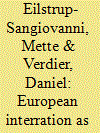

|
|
|
| 12 |
ID:
103515
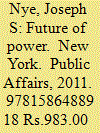

|
|
|
|
|
| Publication |
New York, Public Affairs, 2011.
|
| Description |
xviii, 300p.
|
| Standard Number |
9781586488918
|
|
|
|
|
|
|
|
|
|
|
|
Copies: C:2/I:0,R:0,Q:0
Circulation
| Accession# | Call# | Current Location | Status | Policy | Location |
| 055944 | 303.33/NYE 055944 | Main | On Shelf | General | |
| 056093 | 303.33/NYE 056093 | Main | On Shelf | General | |
|
|
|
|
| 13 |
ID:
158053
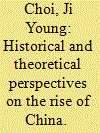

|
|
|
|
|
| Summary/Abstract |
In this article I borrow insights into repeated patterns of global political change from long cycle and power transition theories and apply them to the rise of China. China is on a trajectory to become the largest economy in terms of total economic size, but viewed through the prism of those insights, it has considerable weaknesses or barriers to overcome in order to become a global hegemonic power. Nonetheless, the rise of China could produce significant instability in the interstate system as it develops into a revisionist power. It is too early to conclude that China is a revisionist power, but some signs suggest China has revisionist aims in the Asia Pacific and could become one in the future. In this context, restraining the growth of Beijing's dissatisfaction with the current international order by accommodating it through appropriate roles and status must be considered more seriously by Washington. Another option is for Washington to enhance and upgrade its military capabilities in the Asia Pacific, but its ability to do so successfully hinges on its ability to reinvigorate the US economy.
|
|
|
|
|
|
|
|
|
|
|
|
|
|
|
|
| 14 |
ID:
177649
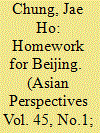

|
|
|
|
|
| Summary/Abstract |
This analysis observes that in 2020 China is a global power with global ambitions and a near-global presence. Terms
such as “G2,” “global stakeholder,” “strategic competitor,”
and “hegemonic candidate” no longer ring hollow as they
did ten years ago. However, it is unclear whether China’s
challenge to the United States will be sustainable in the medium to long run. The essay considers five hurdles in Beijing’s
path to a “responsible great power”—assuming that China
does hope to be one. Certainly, the world does not wish to
see the emergence of an irresponsible China.
|
|
|
|
|
|
|
|
|
|
|
|
|
|
|
|
| 15 |
ID:
165151
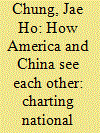

|
|
|
|
|
| Summary/Abstract |
Based on the premise that perception operates either as a catalyst or a constraint for a hegemonic war, this study examines ‘national perceptions’ (i.e. how the citizens of the two states view each other) and ‘official views’ (i.e. how the two governments perceive each other) between the US and China of the post-Cold War period. As for the national views, (1) American perceptions of China have generally become more negative than Chinese perceptions of America; (2) little congruence is found between the two powers on key values and norms; and (3) perceptions are generally getting far ahead of the realities. As for the official views, formal documents do not fully reveal their real state of minds. Diplomatic courtesy and strategic self-esteem runs through them. Yet, America’s strategic concern and growing will to manage China from a position of strength is increasingly more discernible. From the Chinese documents, on the other hand, signs of inferiority have gradually disappeared. In sum, perceptions between the two are working more as a catalyst for strategic competition than a constraint on it.
|
|
|
|
|
|
|
|
|
|
|
|
|
|
|
|
| 16 |
ID:
141500
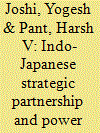

|
|
|
|
|
| Summary/Abstract |
As the U.S.-led security order in Asia gradually comes under stress, regional powers such as India and Japan are formulating a strategic partnership to hedge against the vulnerabilities accruing out of the unfolding power transition in Asia. China’s unprecedented economic and military rise coupled with America’s perceived relative decline is drawing New Delhi and Tokyo into a strategic embrace. To insure their interests in this era of great power transition, New Delhi and Tokyo are keen to hedge against America’s possible failure in containing China’s growing assertiveness in Asia. This hedging strategy is evident in their growing strategic partnership which consists of a triple hedge: increasing bilateral defense partnership against fears of American retrenchment; economic engagement against an over-dependence on China; and a multilateral hedge against China’s growing influence in international and regional institutions. However, for Asia’s two prominent middle powers, transforming these nascent attempts into an effective strategic response to Asia’s current power transition would also require cooperation in the nuclear domain, an area where their policies continue to diverge.
|
|
|
|
|
|
|
|
|
|
|
|
|
|
|
|
| 17 |
ID:
165872
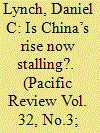

|
|
|
|
|
| Summary/Abstract |
The variations on power transition theory so widely used to frame analysis of U.S.–China relation tend to assume the inevitability or at least strong probability of China surpassing the United States in economic power if not necessarily military power. In the terminology of social psychology’s attribution theory, China is imputed with the identity of a state that is inevitably rising. The Chinese Communist Party encourages this attribution among Chinese people and foreigners. But China’s economic rise – the foundation of its comprehensive rise – appears to have entered an inflection point in the mid-2010s and may now be stalling. In critical respects, China increasingly resembles the last two countries that ‘attempted’ a globe-level rise: the unsuccessful cases of postwar Japan and the Soviet Union. China’s labor force is shrinking; the country relies excessively on unsustainable debt increases to fuel economic growth; and pollution is seriously harming public health. But even if China’s rise conclusively stalls, it may take quite some time before the Chinese public and outside observers recognize the new reality because of intrinsic biases in the cognitive logic of attributing identities to actors.
|
|
|
|
|
|
|
|
|
|
|
|
|
|
|
|
| 18 |
ID:
066934
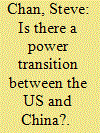

|
|
|
| 19 |
ID:
092037


|
|
|
|
|
| Publication |
2009.
|
| Summary/Abstract |
In this paper we identify and critique the key propositions of power transition theory. We find little support for any of power transition theory's main empirical implications. Contrary to most versions of the theory, we fin d that the European and international systems almost never have been characterized by hegemony. No state has achieved a position that allowed it for any extended period to order the international system to suit its interests at the expense of the other major powers. Power transitions are remarkably rare, they seldom occur as the result of differential rates of economic growth, and have most often occurred peacefully. Power transitions are more often the results of wars, rather than the causes of them. Wars between rising and dominant powers are infrequent and are not waged by either side primarily in the effort to defend or revise the international order in their favor. Finally, we find that war rarely resolves the fundamental conflicts of interest caused by power transitions.
|
|
|
|
|
|
|
|
|
|
|
|
|
|
|
|
| 20 |
ID:
119104
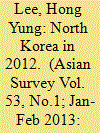

|
|
|
|
|
| Publication |
2013.
|
| Summary/Abstract |
Thus far, North Korea appears to have made a successful transition of power to the third generation of Kims, installing the 28-year-old Kim Jong Un as the country's supreme leader. However, due to the diminishing legitimacy of multiple generations of inherited leadership, Kim Jong Un must deliver what North Korea needs most, namely, economic development. Kim has promised to give it priority, but structural (political, economic, and social) constraints do not allow him much room to maneuver.
|
|
|
|
|
|
|
|
|
|
|
|
|
|
|
|
|
|
|
|
|